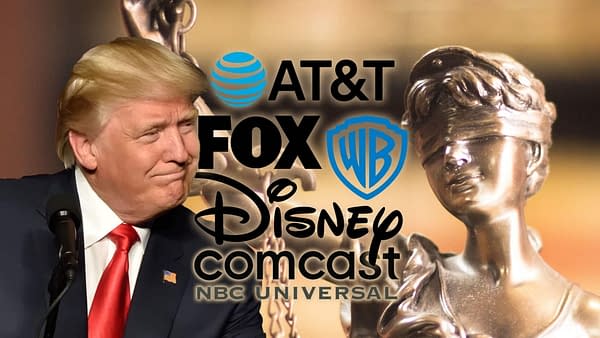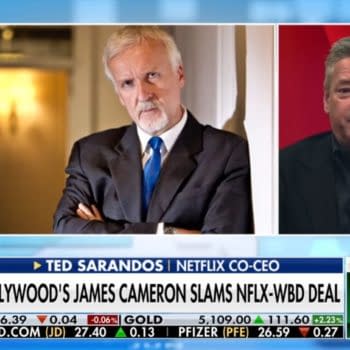Posted in: Movies | Tagged: comcast, disney, donald trump, fox, ike perlmutter, rupert murdoch, Warner Bros
Trump's Biggest Media Play Yet? Disney, Fox, Warner Bros., Universal's Problems Have Just Begun
An interesting sequence of events began right after Thanksgiving last year, at a place where a lot of presidential business has taken place in recent times: on November 27th, 2017, Marvel Entertainment Chairman, major Disney shareholder, and top Trump political donor Ike Perlmutter and his wife had dinner with President Donald Trump at Mar a Lago. Everybody knows we love to track Ike's comings and goings here at Bleeding Cool, and I found Ike expert Rich Johnston's post on the matter funny for the way he made it seem like Eric and Lara Trump and Commerce Secretary Wilbur Ross had been relegated to the kid's table so that Trump and Ike could have a serious adult conversation while they had dinner.
But by the next morning, November 28th, rumor had it that Disney's acquisition of Fox was not only back on, but progressing rapidly, and by that afternoon, Deadline's Mike Fleming was the first reporter to break the news that things were looking good for a Disney/Fox mashup. Coincidence? Maybe. But given Ike's well-documented grudge against Fox for the nature of their FF and X-Men deals, it's difficult to see it as random chance.
At some point subsequent to this, President Trump called Fox News Chairman Rupert Murdoch a longtime acquaintance and confidant, to get his confirmation that Fox News would not be part of the proposed Fox/Disney merger deal:
Before the news broke that Mr. Murdoch had agreed to sell vast parts of his 21st Century Fox to the Walt Disney Company for $52.4 billion, Mr. Trump called him to get his assurance that the Fox News Channel, the highly rated cable network and frequent bullhorn of the Trump agenda, would not be affected.
On December 12th, after Comcast made their own run at Fox — but despite Rupert Murdoch and Comcast CEO Brian L. Roberts's meeting at the New York Athletic Club earlier that week — Reuters reported that the Murdoch family had a hunch that a deal with Disney would be easier to clear with the U.S. Dept of Justice.
The Murdoch family, which controls Fox, prefers a deal with Disney because it would rather be paid in Disney stock than Comcast stock, and expects a potential deal with Disney to be cleared by U.S. antitrust regulators more easily, one of the sources said.
The Murdoch family was correct in this. When Disney and Fox formally announced the deal on December 14th, White House Press Secretary Sarah Sanders told us that President Trump had reached out to Rupert Murdoch to encourage him on the deal:
I know that the President spoke with Rupert Murdoch earlier today, congratulated him on the deal, and thinks that — to use one of the President's favorite words — that this could be a great thing for jobs, and certainly looks forward to, and hoping to see a lot more of those created.
But this month, we've been hearing that Comcast would like to get back into the bidding for Fox. They'd like to do that so much, in fact, that someone involved leaked the details of what they had on the table for Fox in their proposed deal, to show that they'd bid significantly more than Disney:
Disney struck a deal with Fox in December, agreeing to pay $52.4 billion in stock. Fox turned down a Comcast offer that was in the low-$60 billions range, the people said. The assets on the table in both offers were essentially the same, including the Twentieth Century Fox movie and TV studio, international pay TV properties and some U.S. cable networks.
This WSJ report goes on to elaborate on the regulatory concerns that a potential Comcast/Fox merger might face:
A Comcast acquisition of Fox would be a "vertical" deal adding more cable TV channels to a company that also is a powerhouse in channel-distribution. The government signaled concerns about vertical deals when it sued to block AT&T Inc.'s acquisition of Time Warner Inc., a case that heads to trial next month.
But there is widespread disagreement on those concerns about "vertical" merger deals. In October 2016, the man now in charge of the DOJ's antitrust division, Assistant Attorney General for the Antitrust Division Makan Delrahim, told us that they're not a major problem at all:
"I don't see this as a major antitrust problem."
"This is more of what we call a vertical merger — a content with distribution — rather than two competitors merging," he said in an interview with BNN. "I think it'll get a lot of attention, but I don't see this as a major antitrust problem."
Delrahim was a Pepperdine law professor at the time of that statement, and is also a former chief counsel on the U.S. Senate Judiciary Committee and deputy assistant attorney general in the U.S. Justice Department.
And… oh. Here's something else: Delrahim was a registered lobbyist for Comcast in 2009 and 2010, which corresponds with the time that Comcast acquired NBCUniversal from General Electric. That deal was announced in December 2009, and approved by the FCC on January 18th, 2011 — with some conditions attached.
On the face of it, Comcast CEO Brian L. Roberts should like his odds here. The DOJ's chief antitrust cop seems to agree with the fundamental idea that a vertical merger like Comcast/Fox should pass regulatory scrutiny, and Delrahim has even lobbied for him. It's always good to be a billionaire, but it appears that Roberts is taking his meetings at the wrong club these days.
Because on November 20th, Assistant Attorney General Delrahim decided he didn't like the ATT/Time Warner deal so much after all. The Justice Dept has filed a complaint against AT&T and Time Warner to block the deal (pdf). Why the change of heart?
The source, who spoke on the condition of anonymity, added that Delrahim likely changed his mind after more closely inspecting the AT&T-Time Warner deal.
The source explained that the conservative approach to antitrust enforcement prefers requiring companies to spinoff certain chunks of their businesses, rather than putting in place "behavior requirements" that the government would have to police indefinitely.
Delrahim has firmly denied that the White House has interfered with the process, but the DOJ's pressure on Time Warner to sell CNN — a frequent target of President Trump's angry tweets — would seem to make it an open question. As would this rather alarming tidbit in a NY Times report from July 2017 — now made all the more ominous by the fact that the DOJ has indeed moved to block the deal:
White House advisers have discussed a potential point of leverage over their adversary, a senior administration official said: a pending merger between CNN's parent company, Time Warner, and AT&T. Mr. Trump's Justice Department will decide whether to approve the merger, and while analysts say there is little to stop the deal from moving forward, the president's animus toward CNN remains a wild card.
While I don't see anything in that DOJ complaint that shouldn't have been apparent to Delrahim back in October 2016 when he was all for the merger, I will say that his argument here is simple and persuasive: AT&T/DirecTV has the country's largest MVPD (Multichannel Video Programming Distributors) subscriber base, and when that's combined with Time Warner's control of a wide range of popular content, it becomes a violation of Section 7 of the Clayton Act, 15 U.S.C. § 18 because the effect of the resulting combination "may be substantially to lessen competition." The combined entity may increase prices to consumers and stifle innovation by threatening to withhold programming content from rival MVPDs.
It's a smart, simple complaint that's tough to argue against and very easy to sell to the public. Anyone who has subscribed to a satellite service (for example) over the past decade or two will tell you that the situation described in the complaint will almost certainly occur. Is it a violation of the Clayton Act? I couldn't tell you, but I can say that it's clear that most industry observers have vastly underestimated Delrahim so far. He's not the woefully incompetent Trump appointee that we've come to expect in other areas over the past year. Far from it. He has crafted what appears to be a very effective case in this matter.
And it seems that Delrahim is just getting started in this area. Directly on the heels of Comcast's attempt to get back in Fox hunt, comes word from Fox Business reporter Charles Gasparino that that the DOJ has decided it may rattle Comcast's cage over the conditions of the Comcast/NBCUniversal deal.
After reading through most of Assistant Attorney General Delrahim's public statements over the past two years, I would agree with Charles Gasparino that the DOJ will almost certainly be revisiting this matter. Delrahim as much as said so in his keynote address to the American Bar Association's Antitrust Fall Forum this past November:
At the beginning of the last administration, the Division entered into several behavioral consent decrees to resolve vertical mergers it determined to be illegal, such as those in Comcast/NBCU, Google/ITA, and LiveNation/TicketMaster. Several observers took issue with this regulatory approach to antitrust enforcement. For example, law professor and economist John Kwoka and Diana Moss of AAI wrote thoughtfully and critically about the problems of using regulatory solutions to address antitrust violations. They pointed out that "allowing the merger and then requiring the merged firm to ignore the incentives inherent in its integrated structure is both paradoxical and likely difficult to achieve." Likewise, in his 2014 book on merger control, Professor Kwoka recognized the "[i]rony that … traditional regulation has fallen out of favor … [and yet] its essential elements have been incorporated in the revised policy and practice toward merger remedies….."
I agree with that skepticism. Like any regulatory scheme, behavioral remedies require centralized decisions instead of a free market process. They also set static rules devoid of the dynamic realities of the market. With limited information, how can antitrust lawyers hope to write rules that distort competitive incentives just enough to undo the damage done by a merger, for years to come? I don't think I'm smart enough to do that.
Without getting into specifics, I can say that behavioral remedies have proven challenging to enforce today. In recent years, the Division has investigated a number of behavioral decree violations, but has found it onerous to collect information or satisfy the exacting standards of proving contempt and seeking relief for violations. We have a limited window into the day-to-day operations of business, and it is difficult to monitor and enforce granular commitments like non-discrimination and information firewalls. Behavioral remedies presume that the Justice Department should serve as a roving ombudsman of the affairs of business; even if we wanted to do that, we often don't have the skills or the tools to do so effectively.
Believe it or not, we have nearly 1,300 judgments in effect, with some that are well over 100 years old. One dates to 1891. My favorite is the one pertaining to music rolls, still protecting consumers against the ills of anticompetitive behavior in the mechanical organ market. But I understand our Chief Legal Officer Dorothy Fountain prefers the Horseshoer's National Protective Association judgment from 1913. Both are still in effect today. Do you see what I mean about static solutions to the realities of dynamic markets?
The notion that Delrahim has carefully examined 1300 antitrust judgements going back to 1891 for possible problems gives one pause in a Trump era where edge-case government regulation has been weaponized to nuclear levels. Even so, I've come away from my study of Delrahim's public statements and actions of the past couple of years more impressed than I expected to be. His deep knowledge of his discipline seems to be balanced with humility, and he appears to have a devotion to this area of the law that would be hard to fake at this scale. And yet… that doesn't make him immune to political manipulation by others. It might make him more oblivious to it, in fact.
Taken as a whole, this recent sequence of moves — which appear to be driven by President Trump and his political allies — seem designed to force a fundamental change in the shape of several of the country's largest media corporations. According to Fox Business reporter Charles Gasparino, the driving force behind this latest move would be President Trump's "belief the media is too powerful and needs to be defanged."
While major media acquisitions and mergers absolutely deserve close regulatory scrutiny, this reported move by the DOJ to yank Comcast's chain, coming days after Comcast re-emerges as a serious suitor for Fox, is troubling. Assistant Attorney General Delrahim has previously lobbied in favor of Comcast/NBCUniversal, and is on the record stating that he didn't see AT&T/Time Warner as a serious antitrust issue.
The DOJ's moves on matters involving Disney, Fox, AT&T, Comcast, Time Warner, and NBCUniversal require a public explanation from Assistant Attorney General Delrahim. He is by all accounts one of our best experts in this area, but he seems to have made an abrupt about-face on these matters over the past year. His work is for the benefit of the people, and a greater degree of transparency on the DOJ's part is necessary when this sequence of events seems to directly benefit two of the President's close allies — Rupert Murdoch and Ike Perlmutter — both of whom have something to gain from brushing off Comcast as a competitive threat.
And large portions of the DOJ's argument against AT&T/Time Warner applies very well to Disney/Fox too. In fact, Disney's recent acquisition of steaming service BAMTECH has already arguably harmed rivals such as Netflix and lessened consumer choice, under the theory they've put forth here.
Because video distributors aim to cover programming cost increases by raising the prices they charge their customers, the higher prices video distributors would pay for Turner TV networks as a result of this merger would directly hit the pocketbooks of American consumers. The merger would also give the merged firm the incentive and ability to use its control of HBO—which rival video distributors have used to attract customers—to lessen competition among video distributors.
A Fox/Disney merger will likewise only increase such problems for consumers and competitors. That doesn't necessarily mean that it shouldn't be approved, but it does mean that Assistant Attorney General Delrahim will have ample opportunity to demonstrate that he's as smart as I think he is over the coming year, and that he's not just one of the President's men.
















